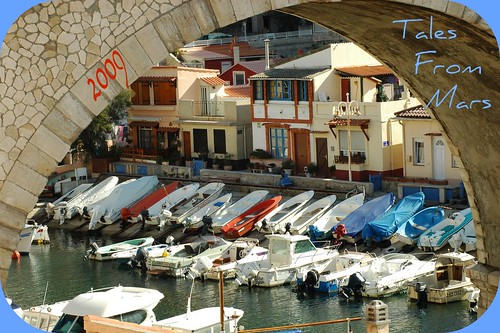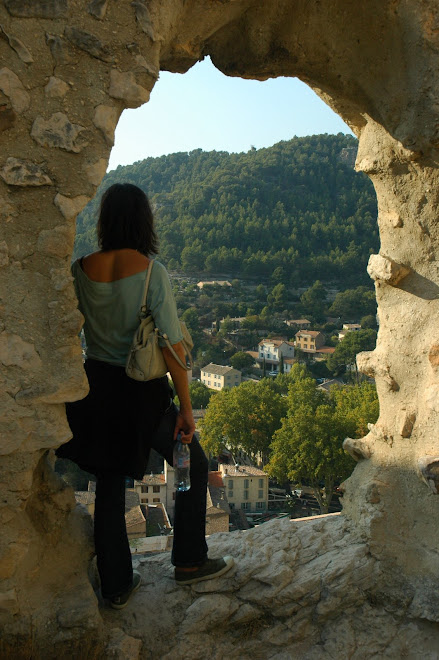Monday, October 22, 2007
Bubbles In the Brain
Despite her level of fluency, a student of mine was having a particularly tough day recalling English words. Like beach and diving. Ah, plage!, she exclaimed slapping her head. C'est dur, hein? I laughed in empathy. I can understand. My husband and I recently had some French friends over, a couple, who have been able to periodically witness my French grow from beginner to intermediate to...whatever it is now. Because I hadn't seen them since July I wanted to show them (or showoff) how much I had progressed but it was exactly this self-inflicted pressure that made me a bumbling idiot who couldn't remember the simplest words. So when my student said that she had "bubbles in the brain" (due to the diving she had done the day before) I understood exactly what she meant -- and took it a step further. When you're learning a language it's as though each word you learn is housed in a miniscule bubble that then floats around in your brain, jostling for space with previous word-bubbles; some burst and POP! it's gone, while others stay intact and make an appearance when you least expect it. I like those bubbles. And then, of course, some don't do anything at all but float and shift and squeeze their way into some unreachable corner of your brain where they retire in effervescent ecstasy. Okay, so I've admittedly taken this a bit too far. And visualizing the language-learning process as a colony of word-bubbles is odd, I know, but so is getting used to expressing yourself in another language. So until that happens -- if it ever happens -- I will proudly admit to my ongoing struggle with bubbles in the brain.
Thursday, October 11, 2007
Pamuk's Passport Got Me Thinking
In 2001, a former professor was emptying his bookcases after a semester's last creative writing class. We all crammed in to his office like a pack of wolves, ravacious for new literature. I came home with twenty-some new books and some of which, to this day, I still haven't read. One of them was Orhan Pamuk's novel, The White Castle. His writing fascinated me from the start. Perhaps it had something to do with the fact that, then, I was writing short stories that similarly dealt with his motifs of East and West. In a pre-9/11 world, and thereafter, his writing gave color and texture to areas of grey. Now a well-known author in the U.S., his most recent piece from the New Yorker is "My First Passport." In a nutshell, thirty years after he went to Geneva as a young boy he was flipping through his first passport when he noticed that the description of his eye color was wrong. Pamuk writes, "What this taught me was that, contrary to what I’d believed, a passport is not a document that tells us who we are but a document that shows what other people think of us." Interesting. I received my first passport in 1999 when I moved to Rome, Italy, to study for a semester. The picture is terrible but that passport bears the stamps of numerous countries and a plethora of memories. And on one particular occassion my identity was inseperable from it. A friend and I were taking a train from Rome to Budapest, a 22-hour trip that sliced through corners of Croatia and Slovenia. In the middle of the night armed guards barged into our cabin demanding money (for border fees). We only understand they want us to pay but we don't have enough money and this wasn't the time of portable credit card machines. But one look at our American passports and they left us alone while the other passengers had no choice. America's global image has changed and we're no longer given such red-carpet treatment but in that moment I was exposed to the perception of an outsider and what he thought of me, as an American not as a person or woman or poor, traveling student. In France my carte de sejour is what carries weight. And when I take it out my identity, to those who perceive me, is immediately certain in that I'm a foreigner but uncertain in that, along with an untold number of prejudices and presumptions, my motives are up for grabs. What am I doing here? Who am I? This was something Pamuk didn't answer and didn't attempt to answer -- and I don't think I'll be able to either, for some time.
Labels:
books,
East,
identity,
Orhan Pamuk,
passport,
The New Yorker,
West
Tuesday, October 9, 2007
Un-deux-trois...cinq-six-sept, Encore!
Nevermind quatre. You have just completed un pas base of salsa. Listen closely, because the instructor will suddenly call out: et main-te-nant en arriere!...avant!...du cote! No worries if you don't speak French, just watch everyone else. Such was the beauty of my first salsa lesson in France. Not only could I visually understand what was being said but most everyone was messing up, stepping out of rhythm, releshing the chance to laugh at themselves and at one another after a long day. In other words, I was having fun in feeling a fool. This isn't often the case. Whether it's trying to master the pronunciation of deux (more like "new," not "do") when ordering croissants on a Sunday morning or not knowing that the demi-pression (a half pint of beer) I asked for was, in fact, what I had already ordered, I often feel a fool. I have no qualms about laughing at myself, with myself, by myself, but there's nothing like doing it in the presence of other French people who usually eye me with a weariness one might, unconsciously, attribute to someone who looks and sounds different. But what was especially fun about the salsa class was that it allowed me, for one smelly and sweaty glorious hour, to feel French. Or not exactly French but like everyone else. There was no room for labels. We were all learning salsa. We were all having to dance with strangers. We were all in it together. Jenny, a friend from Scotland, was with me. From time to time I would glance over in her direction, especially when we were separated (a scary moment) and forbidden to dance with other, men-less women (an odd moment), to see how she was getting along. Although she wore an expression of concentration I had never before witnessed, she was feeling it, too, I thought. We had forgotten where we were -- even the fact that the lady at the welcome desk thought that Jenny's name was Jimmy. Needless to say, we had a good laugh over that one.
Monday, October 8, 2007
Sweep it Under the Rug

If only it were that simple. No, I'm not talking about cleaning house but cleaning a city. And the city I live in, Marseille, can be classified as dirty. But "dirty" has various meanings. It could be, quite literally, a filthy, neglected city where piles of trash gather on every corner (Naples comes to mind) or it could be a edgy city, like Marseille, where the dirt almost seems to have a purposefulness; if not to keep people away then to reinforce a certain mentality or shared identity. Things are changing here; in just a year I've noticed a difference that I thought, at times, was wishful thinking until a friend's mother returned after a year's absence and also noticed a marked difference. Unfortunately it's not the mentality that's changing. Marseille is simply becoming more of a tourist destination and so the motive is economic. Along with the TGV that now connects the city to Paris in just 3 hours, there is a new tram service, sleek and quiet, the renovation of Gare St. Charles and various derelict portions of the city, as well as a series of advertising campaigns aimed at the populace. All of it is long overdue. Perhaps, in part, because the majority of Marseillais are defensive about their city's salete, or dirtiness. It's amazing, really. They either deny it completely, adopt an expression of surprise, or say, Ouais mais on a des calanques, la mer...what they don't realize they're saying is, yes, without the calanques -- beautiful limestone inlets with rocky beaches and aquamarine waters -- or the sea, their city would then be what it is: in need of a major makeover. In a way, it's true. If Marseille was not an ancient port city surrounded by such natural beauty I would tolerate its dirtiness much less. On the other hand, it's exactly the dirt (and by dirt I mean all that is ugly) that gives Marseille its rough, edgy reputation; its character; its unpredictability; and its charm. Perhaps the Marseillais sense this and fear that a drastic change in the city's appearance would mean a drastic change in the Marseillais spirit, itself rather stubborn. But I believe the city is much too unique to have its advantages compromised simply because it's becoming cleaner. There's a long way to go. I'm still dodging piles of dog feces and witnessing people blatantly drop bags and cans to the ground. But at least I can escape it all, if only for a while...
Why a Blog?

Contrary to most bloggers, I'm not one who readily uses or understands technology. I'm a writer, and most writers would love to see the return of the typewriter if only it had the ability to cut and paste. In light of this confession, the idea to start a blog about my life in France seemed counterintuitive. But seeing how much time I have on my hands these days and how writing, for the most part, is a pleasure notwithstanding the kind of technology used, I decided to create this blog. You might find the title deceiving. Although fictional devices may be employed from time to time what I write will neither be fictitious nor from or relating to the planet Mars. Unfortunately. My blogs will instead be about life in Marseille, which sometimes feels entirely unknown and foreign but is actually, surprisingly, home. One cannot be in France without doing what the French do best: complain. But whether I'm complaining, waxing philosophic, or writing about the pleasure of buying a pain au chocolat from the neighborhood patisserie at exactly 4:30, when the day's second batch just comes out of the brick oven, hot and golden brown, this blog will hopefully open a window onto the expat life--in all its misery and glory. So for those of you (expats and non-expats alike) who do take the time to read this blog, please share your thoughts!
Subscribe to:
Posts (Atom)







